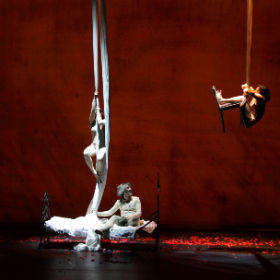He started as he meant to continue. As Loughlin Deegan delivers his fifth and final programme for the Ulster Bank Dublin Theatre Festival as Artistic Director, there is as much continuity as there are new challenges in the three-week event. This year’s Festival features ten world premieres, builds on previous relationships, pursues new connections and reflects both a theatre and nation that has vastly changed since 2007.
As in his first year, Deegan’s programme features new productions from Rough Magic and Fabulous Beast, a Marina Carr play at the Abbey, a playful production from ‘Victorian vaudevillians’ 1927 and the involvement of the Royal National Theatre (this time as co-producers with the Abbey). Most encouragingly, though, the defining imprint on the Festival programme is from new Irish work, much of it nurtured through the Festival’s In Development programme, with several productions created by artists who have partaken in the Next Stage programme of professional development established during Deegan’s tenure in association with Theatre Forum.
This year’s Festival will feature 28 productions, totalling 564 performances, with a diversity and level of activity that is difficult to distil. Landmark Productions, in partnership with the Festival, will premiere a Festival commission, Testament, a new play by Colm Tóibín directed by Garry Hynes and featuring Marie Mullen. Deegan already considers it to be among the best of Tóibín’s written work and it marks the first new Festival commission in 11 years. Meanwhile Rough Magic stage Arthur Riordan’s new version of Peer Gynt, a contemporary retelling of Ibsen’s classic. Giving the Norwegian tale an Irish context, Riordan has also maintained its verse form, while Irish group Tarab supply new music. The nation’s recent economic history and Peer’s fall from heedless affluence to desperate deeds ought to supply the rhyme. Fabulous Beast, whose Midlands Trilogy remains a Festival talking point, return with a dance piece (as distinct to a dance-theatre piece) called Rian in a co-production with Sadler’s Wells. Inspired by Sean Ó Riada’s 1969 performance in the Gaiety, it combines leading traditional Irish musicians, with musical direction by Liam Ó Maonlaí, and a new cast of dancers choreographed and directed by Michael Keegan Dolan.
 International work this year varies from the highly physical spectacle of the Swiss-Russian-Canadian collaboration, Donka, A Letter to Chekhov, to first Irish visits from Cornwall’s Kneehigh and, following their appearance at the 2006 Dublin Dance Festival, the return of Belgium’s Les ballets C de la B with Gardenia, a stylized documentary performance featuring aging transsexuals and transvestites – all of which will be performed in the 1,000-seat Gaiety.
International work this year varies from the highly physical spectacle of the Swiss-Russian-Canadian collaboration, Donka, A Letter to Chekhov, to first Irish visits from Cornwall’s Kneehigh and, following their appearance at the 2006 Dublin Dance Festival, the return of Belgium’s Les ballets C de la B with Gardenia, a stylized documentary performance featuring aging transsexuals and transvestites – all of which will be performed in the 1,000-seat Gaiety.
The cutting edge of European theatre (in the year of Imagine Ireland, there is no American work) is represented in Toneelgroep Amsterdam’s production of La Voix Humaine, directed by Ivo van Hove, while the hotly anticipated She She Pop lead a focus on contemporary German theatre with a postdramatic riff on paternal relationships and Shakespeare’s King Lear in She She Pop & Their Fathers: Testament. As part of a platform entitled The Radical Mind, inspired by the influence of Goethe on German thinking, it is complemented by Gintersdorfer/Klaβen’s Shakespearian riff, Othello C’est Qui, and German-British company Gob Squad’s playful Revolution Now!, where discreetly anglophile tendencies coincide with a programme that marks the 50th anniversary of the Goethe-Institut in Ireland.
There are ten world premieres in this year’s festival, including the Abbey and National Theatre of Great Britain’s co-production of Juno and the Paycock, the Gate’s Hugo Hamilton adaptation, The Speckled People, directed by Patrick Mason, and THISISPOPBABY’s production of a new play by Mark O’Halloran, Trade, directed by Tom Creed and staged in a Dublin guesthouse.
Indeed, site-specific performance is another hallmark of this year’s Festival – six productions are in non-theatrical spaces this year, including Selena Cartmell’s The Lulu House for Siren Productions, bringing the archetypal femme fatale – in the shape of Camille O’Sullivan – to the James Joyce House, while Eileen Walsh’s femme tragique makes her fourth festival appearance in Corcadorca’s Request Programme, staged in a Dublin apartment. A new show from Anu Productions, Laundry, performed in the Gloucester Street Magdalene Convent, makes contemporary issues another specific site of the Festival’s enquiry, echoed by Brokentalkers’ The Blue Boy, an interdisciplinary and international co-production based on child abuse in Ireland’s industrial schools.
This year’s Reviewed programme features five productions, its largest tally, for which Anu Productions’ World’s End Lane will be revived at the Lab, along with three other productions that debuted on last year’s Absolut Fringe: THEATREclub’s unflinching Heroin, Rise Production’s unbeatable Fight Night and HotForTheatre’s unsurpassable I <3 Alice <3 I. The Performance Corporation’s Slattery’s Sago Saga also returns, by the unstoppable Arthur Riordan.
With six production directed by graduates from the Next Stage programme, an evident harmony between the adventurousness of the Fringe and the further exposure of its productions at the Festival, and the fruitful culmination of the UBDTF’s In Development programme, Deegan’s singular achievement has been to make the Festival accessible to new generations of Irish artists, stimulated by the international practice he has exhibited and nurtured by the developmental structure the Festival has provided. Irish audiences and international visitors have similarly gained access to the best of international work and, increasingly, the world-class standards of new Irish productions.
Peter Crawley is News Editor of Irish Theatre Magazine